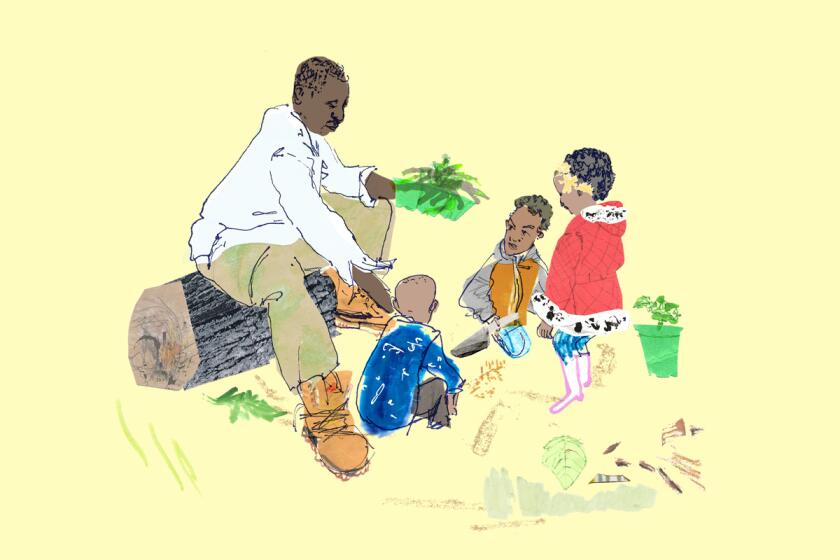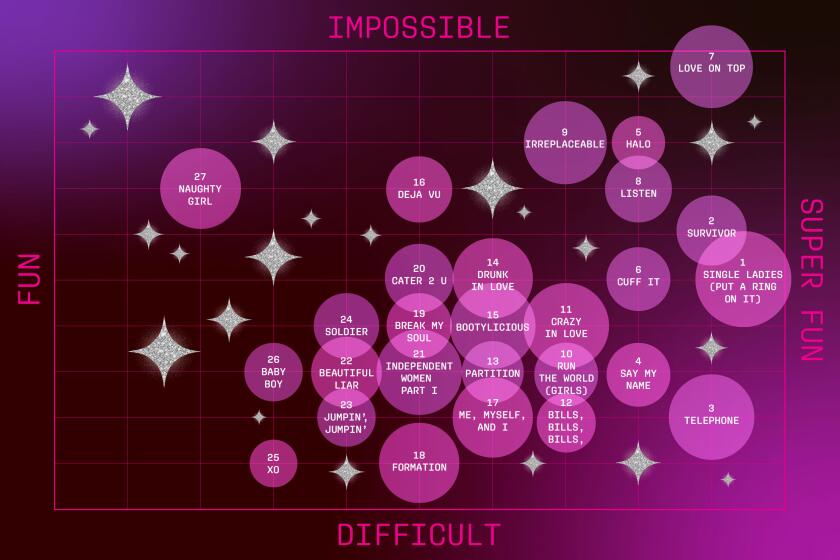You need a hobby. Here’s how to find one that’s right for you

Ryan Gosling knits. Taylor Swift makes her own snow globes.
Though not everyone can star in hit movies or play sold-out tours, anybody can have a hobby to provide relief from the stress and routine of daily life. And whether you’re managing a busy career, looking for work or kicking back in retirement, making time for yourself is a necessary part of leading a healthy, productive life.
A hobby is “something that’s not work, not caring for family and that you do primarily for fun,” said Laura Vanderkam, author of multiple books about time management.
“Mentally, if you’re doing an activity that just absorbs your attention ... it’s getting you out of your headspace,” said Matthew Zawadzki, an associate professor of health psychology at UC Merced who has studied the effects of hobbies. “You’re not ruminating and worrying about what’s happening. You’re invested in the moment, and so that restoration from the relaxation has big effects.”
He also said that hobbies are nature’s way of fighting back against one of our more prevalent emotional states: anxiousness.
A hobby can have social benefits too. “We often do leisure with people,” Zawadzki said, “and so it’s a way to connect socially with others around things that we both like. And you wind up not just doing an activity but sharing yourself too.”
In an age of increased isolation and loneliness, some Americans see skipping self-checkout as a path toward connection.
Granted, some people feel guilty about the time they spend on their fantasy football team, their stamp collection or their sock puppets. “If you’re doing leisure and you’re feeling guilty about it, it’s worse for your mental health than if you never did leisure at all,” Zawadzki said. “So not only is it just distracting you but it’s making you feel more anxious and more depressed in the moment.”
He suggests that in order to stick with a hobby, people should adhere to a routine as if it were a medicine that had been prescribed to them. He has seen that self-care can often be the lowest priority for people, so if they think of their hobby as a prescription, they may be more likely to devote time to it.
“You doing it is making you a better worker, parent, person — fill in the blank with whatever you want,” he said. “And so this is actually contributing not just to your own personal mental health but whatever task you’re trying to get done. ... One of the biggest benefits is getting outside of your head, getting away from the stress that we carry around in our minds. That’s what leisure can do. That’s what its biggest power is.”
Zawadzki also warns to make sure your love for your hobby doesn’t cross the line into obsessiveness — a problem he was introduced to when he studied gaming culture. “People would go for many hours at night and just have a difficulty disconnecting,” he said. And if it’s online games involving a clan or a group, he said, the players depending on one another may make it even harder to stop playing.
Why do you need a hobby?
If you feel a void in your life, hobbies can help you find fulfillment, said Selin Malkoc, a marketing professor at Ohio State University. If you feel unproductive, she said, you can choose a hobby in which you produce something, such as painting or ceramics. Picking a hobby with a concrete output can give you a sense of purpose by leaving you with a physical product to show for your work.
On the other end of the spectrum, Malkoc said, “There’s a lot of us that are just over-stressed. ... We find too much meaning in life and we have families that we devote ourselves to, but then we don’t have anything for ourselves.” Hobbies, she said, let people focus on themselves and find value there, not just in their job or family responsibilities.
And hobbies can even help you sleep better, according to a 2015 study by Zawadzki and two other authors. Using Fitbits and other monitors to collect biometric data from participants, he said, the researchers found that the subjects slept better on the days after they pursued hobbies than the days they did not. “There’s real evidence that it’s helping them,” he said.
Los Angeles County has more than 100 community gardens. Here is why you might want to join one and how to get started growing food and community.
How do I find one?
Finding a hobby starts with adjusting what you think a hobby is.
Vanderkam said a common mistake is to think you don’t have any free time, so you just do what’s right in front of you — such as reading social media posts. The point, she said, is to explore for something to do with all the time you’re spending “on Facebook, or scrolling headlines, or whatever it is.”
It’s also important to understand that you don’t have to be good at your hobby or impress people with it — it’s something you’re doing for your own enjoyment. It defeats the purpose to apply a work mind-set to a hobby, Malkoc said, adding: “If we put pressure on ourselves to be the best at our hobby, then we are equating it to our jobs, which is what we are supposed to get away from in the first place.”
One way to get ideas for hobbies is to consult websites that make personalized recommendations, such as Discoverahobby.com. Peruse its 10 categories of hobbies based on your interests and try some out.
Meetup.com is a website that allows people to find other people who share their interests, giving users the opportunity to socialize with people they relate to and share in their love for a hobby. Another way to find other people to do or share insights about your hobby with is Facebook groups.
There is also a wide variety of websites that focus on specific hobbies. For example, alltrails.com provides trail info, maps and reviews for hikers. Reserveamerica.com lets adventurers secure reservations for campgrounds, lodging and boat rentals. Jigsawexplorer.com offers virtual puzzles for users to put together from anywhere. Multiple sites, including Board Game Arena and Happy Meeple, enable you to play board games with people from around the world. There is something for everyone.
Vanderkam suggests thinking back on your teenage years and recalling the activities you chose for yourself, rather than the ones your parents picked for you. “Because you know, you are the same person,” she said. “So if you’re looking for something to fill your time now, that’s probably a good bet.”
Singing Beyoncé in karaoke is less about hitting the notes and more about channeling her Virgo power. Here are her 27 best karaoke songs, according to pseudoscience.
Consider what resources your community offers. AARP’s website recommends signing up for a class at your local community college or community center or taking online courses.
“If you love surfing but you live in Kansas, you need something else,” Vanderkam said. So ask your friends, the people at your house of worship or other shoppers at the grocery store, she said, and look for announcements about happenings around town, such as those posted on a library bulletin board.
Be flexible, Zawadzki said, and don’t think there’s one hobby that’s perfect for you. “Allow yourselves to just try multiple things, put a little bit of investment in a wide range of things to start to figure out what works, and be comfortable with saying, ‘Hey, this wasn’t the right thing,’” he said.
Think about your goals and what you want to help yourself with at this moment, physically or mentally. “If you feel lonely, let’s find that social activity,” Zawadzki said. “If you’re feeling in a rut, let’s find that activity that’s going to make you feel good. If you have a lot of energy today, let’s go challenge yourself to improve and get better.”
Look for something that excites you, rather than adding to the list of things you should do, Vanderkam said. “We tend to feel more energy and motivation toward something that you really do truly want to do.”
How do I make time for my hobby?
Avoid such empty declarations as “I should draw more” and find a way to hold yourself accountable, Vanderkam said. “If you decide to join that flute trio, you’re gonna have to rehearse together,” she said, which means committing to a schedule. “That’s a very different mind-set than, like, ‘I’m gonna take more bubble baths.’” It also helps ensure that your hobby time “doesn’t just go away whenever anyone else wants something from me,” she said.
Vanderkam has often heard people say that they don’t have time for a hobby, but the real problem is a lack of energy or motivation. If you truly want to take your hobby seriously, she suggests asking yourself how you can structure your time, motivation and energy to make sure you follow through.
California regulators have made investing in solar power less attractive. But if you’re the typical energy user, it still makes long-term financial sense to do so.
Finding the right time to pursue your hobby is important as well. If you are consistently too tired after work, Vanderkam said, try doing your hobby in the morning. Her time management rule: “Take one night for you. Take one night every week to do something. Like, make a commitment to something that is not work and not family.”
Vanderkam said a woman she knew decided to reacquaint herself with tennis, her childhood hobby. She decided to set aside one night a week to play, and when she came home from the first outing, her husband said: “You’re glowing.” This became something she could look forward to, Vanderkam said, and it helped this woman structure her week.
Leaving no time for personal pursuits can lead people to burn out, Vanderkam said. “If they don’t have anything in their life that is inherently interesting to them, it’s like all things [they] have to do, not things [they] want to do.”
What do I do if I am losing interest in my hobby?
Vanderkam suggests that you start by understanding why it is happening. Is it because other people have an issue with it? For example, maybe your spouse would prefer you didn’t leave them with the kids one night a week. If stopping your hobby is what someone else wants, then that shouldn’t be a reason to abandon it, she said.
If you don’t want to do it anymore, Vanderkam said, then it may be time to start exploring all the other options out there. If you are feeling burned out but aren’t ready to give up your hobby, she suggested taking a short break to heal.
If you land on the right hobby, it can become a fundamental part of your life, a lifelong passion. Zawadzki tells the story of a man who loved to carve wood with a chainsaw. One day the man didn’t do the proper checks and injured himself so badly, he couldn’t walk for six months. When he recovered, he went right back to chainsaw woodworking, Zawadzki said — “He just learned how to prepare better to do his carving.”
About The Times Utility Journalism Team
This article is from The Times’ Utility Journalism Team. Our mission is to be essential to the lives of Southern Californians by publishing information that solves problems, answers questions and helps with decision making. We serve audiences in and around Los Angeles — including current Times subscribers and diverse communities that haven’t historically had their needs met by our coverage.
How can we be useful to you and your community? Email utility (at) latimes.com or one of our journalists: Jon Healey, Ada Tseng, Jessica Roy and Karen Garcia.
More to Read
Sign up for The Wild
We’ll help you find the best places to hike, bike and run, as well as the perfect silent spots for meditation and yoga.
You may occasionally receive promotional content from the Los Angeles Times.















